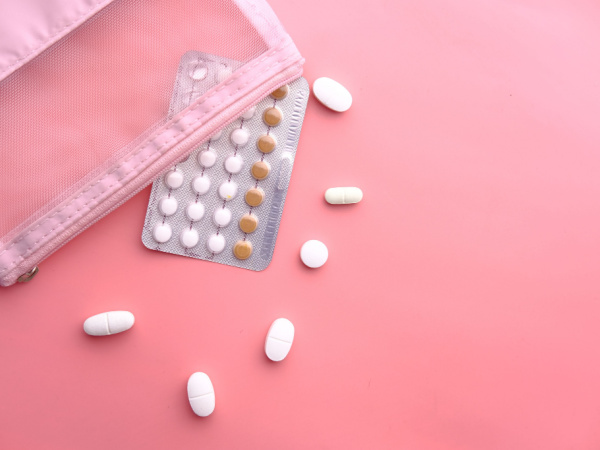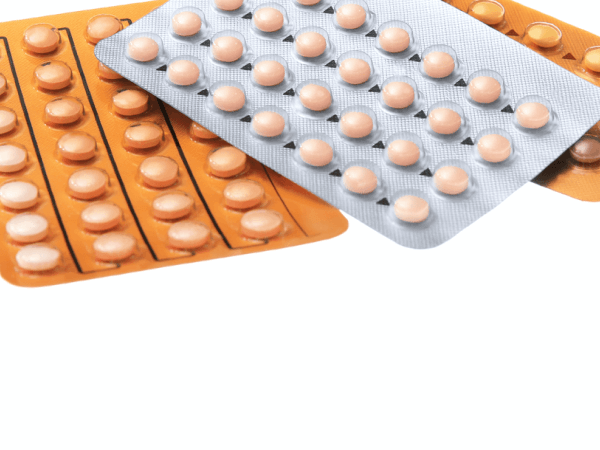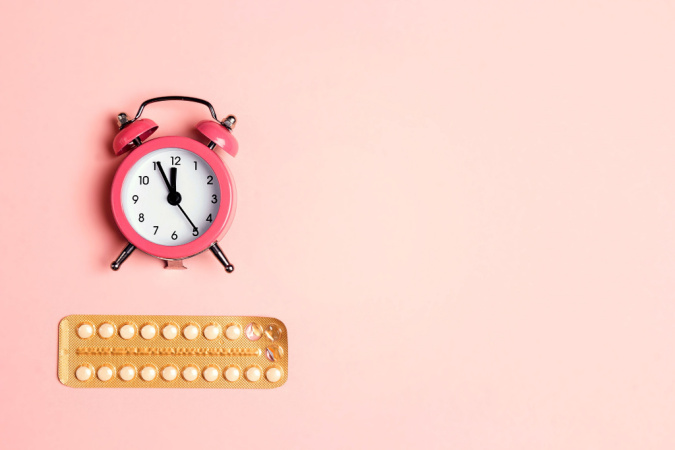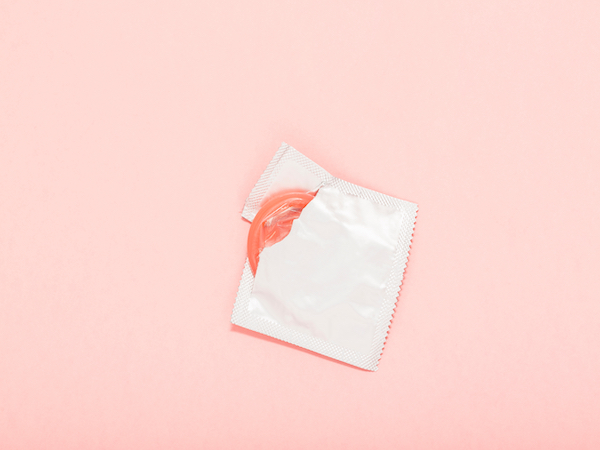Estrogen is often considered a crucial ingredient in birth control pills — yet, did you know that some pills contain low levels of the hormone or even no estrogen at all?
Low-estrogen birth control pills can be an excellent option for women who are not well-suited for regular-dose estrogen pills. These pills work the same as regular dose pills and can provide effective contraception and menstrual cycle regulation.
This article discusses everything you need to know about low-estrogen birth control pills, including brands available in Canada.

Get birth control delivered to your door
Fast online assessment with a Canadian nurse practitioner. Choose your method, get your prescription, never run out.
What is low estrogen birth control?
Many birth control pills contain two main hormones — estrogen and progesterone.
For some women, a high dose of estrogen is unsuitable due to certain health conditions or lifestyle habits. As such, some alternatives contain lower doses of estrogen and are called low-estrogen birth control pills.
How low estrogen pills work
Low estrogen pills work the same as regular dose estrogen pills by inhibiting the ovaries from releasing an egg, thickening the cervical mucus to prevent sperm from reaching an egg, and thinning the lining of the uterus to prevent egg implantation.
The main difference between low estrogen birth control pills and regular-dose pills is that low-dose pills are more suitable for women with certain health conditions, like high blood pressure.
Some low-dose pills contain no estrogen, such as the mini-pill containing only progestin.
Women over a certain age or with a high risk of developing high blood pressure or heart-related conditions may prefer non-estrogen pills.
Birth control estrogen levels
Every birth control pill will have a varying level of estrogen and other hormones, depending on the brand.
In Canada, regular-dose estrogen-containing birth control pills typically have between 35 to 40 micrograms (mcg) of ethinyl estradiol per pill.
Low estrogen pills generally have 10 to 30 mcg of ethinyl estradiol.
The highest dose of estrogen found in pills available in Canada is 40mcg.
How much estrogen is considered low?
You can receive the lowest estrogen dose in Canada in estrogen-containing pills is 10 mcg.
However, some low estrogen pills may have up to 30 mcg of estrogen per pill, depending on the brand. A healthcare practitioner can help you determine which dose is best for you.
Who should consider low-estrogen birth control pills?
As we have covered, women with certain health conditions or lifestyle habits can be ill-suited for regular-dose estrogen-containing pills.
This may include women who:
- Have or are at risk of high blood pressure
- Have or are at risk of heart-related diseases (heart disease, stroke, etc.)
- Are over the age of 35
- Smoke tobacco/nicotine products
- Experience unwanted menstrual side effects from regular or high-dose estrogen pills
Low estrogen pill effectiveness
Low estrogen pills’ effectiveness is considered around the same as regular ones.
With typical use, the effectiveness of all hormonal birth control pills is 91%, while with perfect use, it is 99.7%. Typical use is consistent use with an occasional forgotten or late pill. Perfect use is taking the pill simultaneously every day and never missing a pill or taking a pill late.
Benefits of low estrogen birth control pills
Low estrogen birth control pills have many of the same benefits as other pills.
These benefits can include the following:
- Pregnancy prevention
- More regular periods
- Lighter menstrual flow
- Less severe or painful cramps
- Reduced PMS symptoms
- Reduced risk of endometrial or ovarian cancer
If a low estrogen pill is taken continuously without a hormone-free interval, these pills can also prevent your period from occurring. Always consult with your healthcare practitioner before skipping a planned hormone-free interval.
Risks to consider for low estrogen birth control pills
An unexpected pregnancy is the most significant risk with low estrogen birth control.
When birth control pills are taken continuously without a hormone-free interval, the user may not have a regular monthly period. As a result, a pregnancy may go undetected for several weeks or months since the user is not interpreting the lack of a period as a sign of pregnancy.
For this reason, some women prefer a seven-day hormone-free interval to allow their regular period to occur.
Additionally, any estrogen-containing birth control pill may increase the risk of high blood pressure. A non-estrogen, progestin-only birth control pill may better suit anyone at risk of this condition.
Side effects of low estrogen birth control pills
Like any medication, some side effects can occur when starting your prescription.
These side effects may include:
- Nausea
- Tender breasts
- Headaches
- Spotting between periods
- Weight gain
Most side effects should go away after a couple of months of taking the pill. If your side effects persist beyond 2 to 3 months or worsen in severity, contact your healthcare practitioner immediately.
Other types of birth control
Aside from hormonal birth control pills, there are a variety of other birth control methods to choose from.
Some can be used in tandem with birth control pills (like condoms), while others are meant as an alternative to birth control pills (like IUDs).
These birth control methods include:
- Intrauterine devices (IUDs): IUDs can be either hormonal or non-hormonal. They are inserted into the uterus by a healthcare practitioner and can last up to 10 years.
- Male external condoms: External condoms are worn on an erect penis and can be made from either latex or polyurethane. They also provide STD protection.
- Female internal condoms: Internal condoms are placed inside the vagina and are made from polyurethane. They also provide STD protection.
- Diaphragms and cervical caps: Diaphragms and cervical caps are small silicone devices that are self-inserted into the vagina to block the entryway to the cervix. They vary depending on placement accuracy and are used in tandem with spermicide.
Sex & U — an initiative of the Society of Obstetricians and Gynaecologists of Canada — offers excellent educational resources on both hormonal birth control and non-hormonal birth control methods available in Canada.
Choosing the right birth control pill for you
When it comes to which birth control pill (or birth control alternative) is right for you, it highly depends on factors such as age, pre-existing health conditions, and lifestyle habits.
The best way to choose the ideal birth control option that meets your needs is to speak with a healthcare practitioner. Professional guidance will thoroughly assess your needs before any prescription is given.
If you are curious about low estrogen pills, mention this to your healthcare practitioner at your next visit or consultation.
Talk to your healthcare practitioner about your choices
Having open and honest conversations with your healthcare practitioner about your health and goals is essential — especially when seeking a birth control prescription.
Here are some essential questions to consider and ask your healthcare practitioner about:
Are all types of birth control pills appropriate for everyone?
No, not all types of birth control pills are suitable for everyone.
Some women are incompatible with estrogen-containing pills due to certain health conditions, age, and lifestyle habits.
Are low-dose estrogen pills less effective?
No, low-dose estrogen pills are not less effective.
These pills have the same effectiveness as regular-dose estrogen pills.
Do low-dose estrogen pills cause weight gain?
Most birth control pills can cause minor weight gain when starting the prescription.
If your weight gain is extreme and persistent, contact your healthcare practitioner immediately about this — you may want to switch to a pill or other birth control option that is more compatible with your body’s needs.
Key takeaways
Low estrogen birth control pills can be an excellent option for women who experience unwanted side effects from estrogen or have health conditions or lifestyle habits that are not suitable for estrogen.
Get started with Felix today to discuss what birth control options may suit you.




